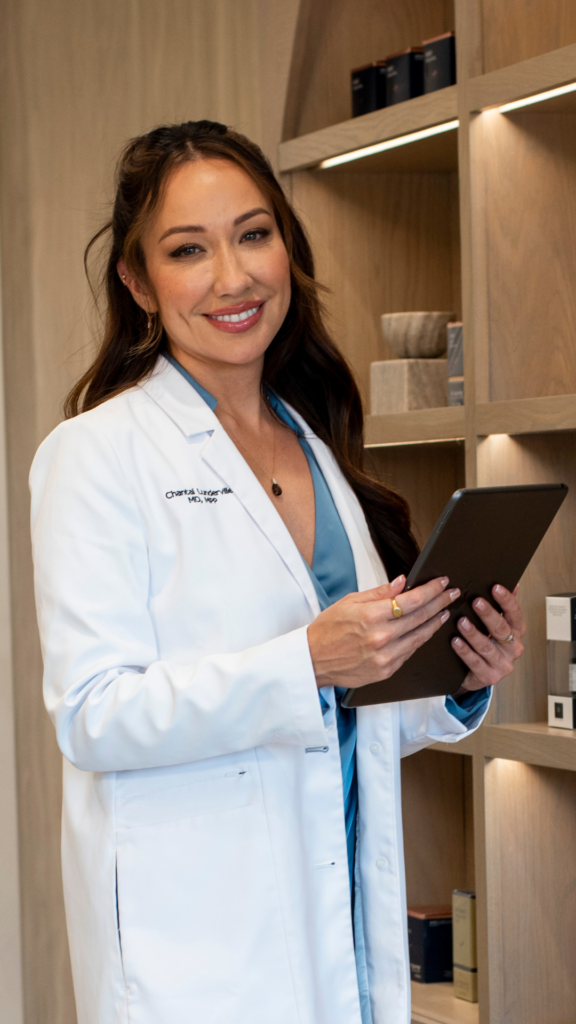When I first started my practice as a doctor I remember feeling like such an imposter. Patients would bring me Sephora products I had never heard of, and creams from other countries which I could not read the label. If you only knew how often doctors use Google! I was at the peak of educational training, and yet I knew less than the average teenager about common skin care products. In today’s TikTok influencer environment, how do we become true experts?
Dr. Chantal Lunderville, L+A Medical + Wellness Editor
Dr. Chantal Lunderville is a board-certified physician specializing in skin health, aesthetic medicine, and Women’s health. She attended medical school at UCLA School of Medicine, followed by a residency at UCSF Family Medicine, and on graduating opened her own concierge aesthetics practice in the San Francisco Bay Area focusing on hormone health, skincare, and longevity.
Since then Dr. Lunderville has grown her practice to include overseeing nurses and aestheticians as medical director to over 15 practices across California, and through Dr. C’s Academy helps to launch new practices across the US and Canada through consulting and online courses in business, compliance, aesthetic procedures including neurotoxin, fillers, lasers, microneedling, and lasers. Read Full Bio
The definition of an expert is “having great knowledge and experience in a trade or profession.” Notice it is BOTH knowledge and experience. As med spa professionals, the key is to invest in both so that we can feel empowered to make recommendations to our patients who are drowning in information overload.
3 Ways To Establish Yourself as an Expert in Today’s Market
1 Create Your Own Style
Many professionals simply “copy-paste” the protocols they have learned from their instructor or place of work. Do you honestly know why those products were chosen in that order? Or how to modify? One of my top dermatology nurses Lizette Ludwig, RN with BEAM Aesthetic Lounge told me that she approached skin like an entrepreneur well before she had her own med spa by reading books, shadowing on her own time, taking courses, and asking lots of questions.
2 Stay Fresh
The wellness industry is changing all the time. For years practitioners used hydroquinone for hyperpigmentation, melasma, and general brightening. However, in 2022 a large-scale study was published about the link between skin cancer and long-term hydroquinone use. This has applied pressure to the FDA to remove products with high levels of it from stores, and we now recommend limiting its use to 3 months at a time. Staying on top of trends, new studies, and laws helps us keep patients safe and builds trust with your following.
3 Speak Up
I notice with new aestheticians and injectors, they are often afraid of recommending a cosmetic treatment for fear of making the patients feel bad about themselves. However, being an expert is about owning our expertise. Share with your clients what your recommendation is and why. Share what you learned at the last event or from a training you did. Get online and post about it, give your “hot take” on slugging, exosomes, or double cleansing! Think of the most common questions you get asked and answer it in a short video.
Here is a quick IG live I did addressing one of the most common topics I work on with nurses who are launching their spas.
Learning is vulnerable. We have to be okay to be wrong. My biggest challenge as a new doctor was being okay asking aestheticians for help with my acne patients (yes! It’s true) because medical school teaches you algorithms for acne using strong medications rather than active ingredients. After I was humbled and found I could treat most of my patients with skincare rather than antibiotics, I was hooked. Now understanding active ingredients in products, peels, post-procedure, and body care is a passion of mine, as well as which ingredients to avoid and how to make our lifestyle more clean in general.
In conclusion, never stop learning. Sign up for classes where you can collaborate with peers, talk through your experiences, and learn new techniques and science. Journal and take notes about your patients, what worked and what did not. And lastly, share with others what you have learned, online and in groups. To quote Niels Bohr, “An expert is a man who has made all the mistakes which can be made, in a narrow field” There are no mistakes, just re-directions that are turning you into a master of your craft.

